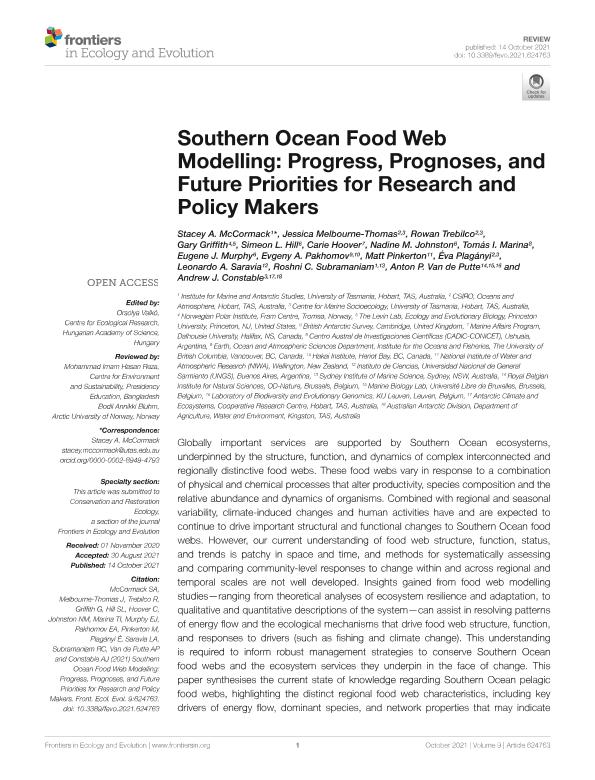Mostrar el registro sencillo del ítem
dc.contributor.author
McCormack, Stacey A.
dc.contributor.author
Melbourne-Thomas, Jessica
dc.contributor.author
Trebilco, Rowan
dc.contributor.author
Griffith, Gary
dc.contributor.author
Hill, Simeon L.
dc.contributor.author
Hoover, Carie
dc.contributor.author
Johnston, Nadine M.
dc.contributor.author
Marina, Tomas Ignacio

dc.contributor.author
Murphy, Eugene J.
dc.contributor.author
Pakhomov, Evgeny A.
dc.contributor.author
Pinkerton, Matt
dc.contributor.author
Plagányi, Éva
dc.contributor.author
Saravia, Leonardo Ariel

dc.contributor.author
Subramaniam, Roshni C.
dc.contributor.author
Van de Putte, Anton P.
dc.contributor.author
Constable, Andrew J.
dc.date.available
2021-12-09T15:01:34Z
dc.date.issued
2021-10
dc.identifier.citation
McCormack, Stacey A.; Melbourne-Thomas, Jessica; Trebilco, Rowan; Griffith, Gary; Hill, Simeon L.; et al.; Southern Ocean Food Web Modelling: Progress, Prognoses, and Future Priorities for Research and Policy Makers; Frontiers Media; Frontiers in Ecology and Evolution; 9; 10-2021; 1-22
dc.identifier.issn
2296-701X
dc.identifier.uri
http://hdl.handle.net/11336/148493
dc.description.abstract
Globally important services are supported by Southern Ocean ecosystems, underpinned by the structure, function, and dynamics of complex interconnected and regionally distinctive food webs. These food webs vary in response to a combination of physical and chemical processes that alter productivity, species composition and the relative abundance and dynamics of organisms. Combined with regional and seasonal variability, climate-induced changes and human activities have and are expected to continue to drive important structural and functional changes to Southern Ocean food webs. However, our current understanding of food web structure, function, status, and trends is patchy in space and time, and methods for systematically assessing and comparing community-level responses to change within and across regional and temporal scales are not well developed. Insights gained from food web modelling studies—ranging from theoretical analyses of ecosystem resilience and adaptation, to qualitative and quantitative descriptions of the system—can assist in resolving patterns of energy flow and the ecological mechanisms that drive food web structure, function, and responses to drivers (such as fishing and climate change). This understanding is required to inform robust management strategies to conserve Southern Ocean food webs and the ecosystem services they underpin in the face of change. This paper synthesises the current state of knowledge regarding Southern Ocean pelagic food webs, highlighting the distinct regional food web characteristics, including key drivers of energy flow, dominant species, and network properties that may indicate system resilience. In particular, the insights, gaps, and potential integration of existing knowledge and Southern Ocean food web models are evaluated as a basis for developing integrated food web assessments that can be used to test the efficacy of alternative management and policy options. We discuss key limitations of existing models for assessing change resulting from various drivers, summarise priorities for model development and identify that significant progress could be made to support policy by advancing the development of food web models coupled to projected biogeochemical models, such as in Earth System models.
dc.format
application/pdf
dc.language.iso
eng
dc.publisher
Frontiers Media

dc.rights
info:eu-repo/semantics/openAccess
dc.rights.uri
https://creativecommons.org/licenses/by/2.5/ar/
dc.subject
ANTARCTIC
dc.subject
ECOSYSTEM MODELS
dc.subject
ECOSYSTEM-BASED MANAGEMENT
dc.subject
FOOD WEB ASSESSMENT
dc.subject
MARINE POLICY
dc.subject.classification
Oceanografía, Hidrología, Recursos Hídricos

dc.subject.classification
Ciencias de la Tierra y relacionadas con el Medio Ambiente

dc.subject.classification
CIENCIAS NATURALES Y EXACTAS

dc.title
Southern Ocean Food Web Modelling: Progress, Prognoses, and Future Priorities for Research and Policy Makers
dc.type
info:eu-repo/semantics/article
dc.type
info:ar-repo/semantics/artículo
dc.type
info:eu-repo/semantics/publishedVersion
dc.date.updated
2021-12-03T18:00:38Z
dc.journal.volume
9
dc.journal.pagination
1-22
dc.journal.pais
Estados Unidos

dc.description.fil
Fil: McCormack, Stacey A.. University of Tasmania; Australia
dc.description.fil
Fil: Melbourne-Thomas, Jessica. University of Tasmania; Australia
dc.description.fil
Fil: Trebilco, Rowan. University of Tasmania; Australia
dc.description.fil
Fil: Griffith, Gary. University of Princeton; Estados Unidos
dc.description.fil
Fil: Hill, Simeon L.. British Antarctic Survey; Reino Unido
dc.description.fil
Fil: Hoover, Carie. Dalhousie University Halifax; Canadá
dc.description.fil
Fil: Johnston, Nadine M.. British Antarctic Survey; Reino Unido
dc.description.fil
Fil: Marina, Tomas Ignacio. Consejo Nacional de Investigaciones Científicas y Técnicas. Centro Austral de Investigaciones Científicas; Argentina
dc.description.fil
Fil: Murphy, Eugene J.. British Antarctic Survey; Reino Unido
dc.description.fil
Fil: Pakhomov, Evgeny A.. University of British Columbia; Canadá
dc.description.fil
Fil: Pinkerton, Matt. National Institute Of Water And Atmospheric Research.; Nueva Zelanda
dc.description.fil
Fil: Plagányi, Éva. University of Tasmania; Australia
dc.description.fil
Fil: Saravia, Leonardo Ariel. Universidad Nacional de General Sarmiento; Argentina
dc.description.fil
Fil: Subramaniam, Roshni C.. University of Tasmania; Australia
dc.description.fil
Fil: Van de Putte, Anton P.. Université Libre de Bruxelles; Bélgica. Katholikie Universiteit Leuven; Bélgica
dc.description.fil
Fil: Constable, Andrew J.. University of Tasmania; Australia
dc.journal.title
Frontiers in Ecology and Evolution
dc.relation.alternativeid
info:eu-repo/semantics/altIdentifier/doi/http://dx.doi.org/10.3389/fevo.2021.624763
dc.relation.alternativeid
info:eu-repo/semantics/altIdentifier/url/https://www.frontiersin.org/articles/10.3389/fevo.2021.624763/full
Archivos asociados
